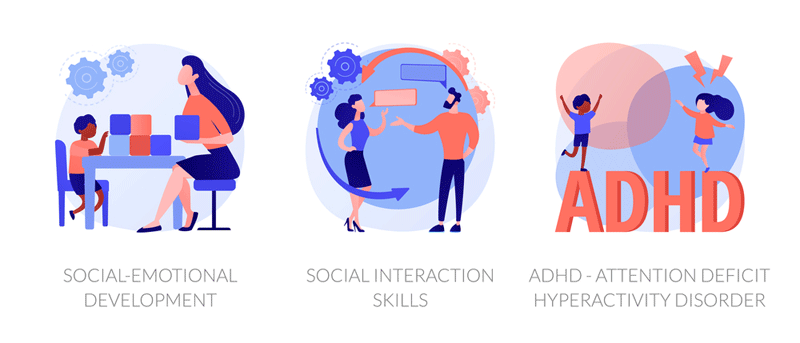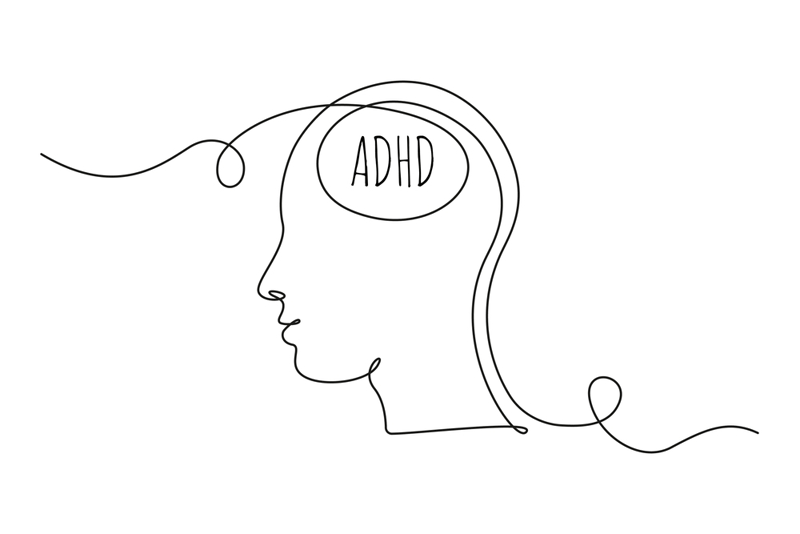Attention Deficit Hyperactivity Disorder (ADHD) in men often remains veiled behind misconceptions and stereotypes. ADHD is a neurodevelopmental disorder characterised by a symphony of symptoms such as distractibility, impulsiveness, and hyperactivity. It’s a complexity that affects each individual distinctly.
ADHD Through the Ages: From Childhood to Adulthood
ADHD is not just a childhood disease; it’s a lifelong companion. This section traces the journey of ADHD from the playgrounds of childhood to the boardrooms of adulthood.
Causes of ADHD in Men
- Genetic Factors
- Environmental Influences
- Brain Chemistry and Structure
Genetic Factors: The Inherited Aspect of ADHD
The tendrils of ADHD are often traced back to genetic roots. Studies have shown that ADHD can run in families, suggesting a strong inherited component to this complex disorder.
Environmental Influences: From Childhood to Adulthood
Beyond genetics, environmental factors play a pivotal role. Traumatic experiences, upbringing, and societal pressures can all contribute to the manifestation of ADHD in men.
Read More About Benefits of probiotics for women: Boosting Gut Health & Beyond.
Brain Chemistry and Structure: The Neurological Underpinnings
ADHD is not a mere behavioural issue; it’s deeply rooted in the brain’s chemistry and structure. Differences in certain brain regions and neurotransmitter activity are central to understanding ADHD.
Symptoms of ADHD in Men
These are as follows:
The Classic Trio: Inattention, Hyperactivity, and Impulsivity
The hallmark symptoms of ADHD inattention, hyperactivity, and impulsivity are well-known. However, their manifestation in men can be subtly different, often leading to underdiagnosis.
Beyond the Obvious: Lesser-Known Symptoms in Men
ADHD in men can be a confidential process, with symptoms like emotional dysregulation and difficulty with relationships flying under the radar.
Adult ADHD: How Symptoms Manifest Differently in Men
In adulthood, ADHD can be a cover of invisibility, often mistaken for mere forgetfulness or lack of motivation. Recognising these subtleties is key to proper diagnosis and management.
Men’s Hidden Struggles with ADHD
Men with ADHD often become masters of disguise, hiding their struggles behind a mask of coping mechanisms and masking behaviours.
Stigma and Misunderstandings: Society’s Role
Society’s uneven perceptions of masculinity can exacerbate the challenges men with ADHD face, often leading to internalised stigma and reluctance to seek help.
Relationships and ADHD
ADHD can be an uninvited guest in a relationship, leading to misunderstandings and conflicts. Recognising its impact is the first step toward building healthier connections.
Problems Faced by ADHD Patients in Personal and Professional Life

Attention-Deficit/Hyperactivity Disorder (ADHD) often casts a wide net, influencing various aspects of an individual’s life. The ripples of this neurodevelopmental disorder extend beyond the mere inability to focus; they seep into the personal and professional realms, creating unique challenges. Here, we articulate the multifaceted difficulties an ADHD patient might encounter, delineated in a bullet-point format for clarity.
Personal Life
- Relationship Struggles: Individuals with ADHD often find maintaining relationships strenuous due to impulsive actions, forgetfulness, and inconsistent attentiveness. These traits can lead to misunderstandings and strained communications.
- Emotional Dysregulation: Managing emotions can be a severe battle. Mood swings, frustration, and heightened emotional responses to everyday situations can become commonplace.
- Time Management Challenges: The concept of time often evades those with ADHD, resulting in chronic delay or mismanagement of daily tasks and obligations.
- Difficulty with Organization: Disorganization is about more than just cluttered spaces. It’s about the chaos involved in managing life’s demands, which leads to overwhelming stress and anxiety.
- Parenting Hurdles: ADHD symptoms can make parenting more complex. Patience, consistency, and routinevital parenting elementscan be significantly harder to maintain.
Learn More About: Do Womens Probiotics Trigger Diarrhea?
Professional Life
- Workplace Distractions: The cacophony of a busy office or even the silence of a home office can be equally distracting. The need for more focus amid interruptions often leads to decreased productivity.
- Meeting Deadlines: Procrastination and time mismanagement can make deadlines feel insurmountable, leading to a cycle of stress and rushed work.
- Impulsivity in Decision-Making: Snap decisions without thorough deliberation can lead to professional missteps. This impulsivity might be misinterpreted as recklessness.
- Difficulty in Team Collaboration: Group dynamics require listening and patience. ADHD can make these collaborations challenging, often leading to miscommunications or missed cues.
- Inconsistent Performance: The fluctuating nature of ADHD symptoms can lead to variability in work performance, often misconstrued as a lack of effort or commitment.
Top 5 Advice for ADHD Men
In today’s dynamic world, navigating the intricacies of daily life with Attention-Deficit/Hyperactivity Disorder (ADHD) presents unique challenges, especially for men. By harnessing potential strategies and optimising daily routines, one can thrive with this special wiring. Here’s a compendium of five salient pieces of advice for men grappling with ADHD.
1. Embrace Structure and Routine
- Cognizant Living: Being acutely aware of how your mind functions is pivotal. Men with ADHD often find solace in predictability. A structured daily routine can attenuate the unpredictable ebbs and flows of energy and attention.
- Temporal Tools: Utilize planners, digital calendars, and reminders. These instruments serve not merely as organizational tools but as external repositories for one’s thoughts and obligations, thereby lightening the mental load.
2. Exercise Regularly

- Neurochemical Renaissance: Physical activity has been incontrovertibly linked to the release of dopamine and norepinephrine. For individuals with ADHD, these neurotransmitters are in scant supply, making exercise not just beneficial but almost therapeutical.
- Mind-Body Nexus: Beyond the biochemical, the rhythm and regularity of exercise can mirror the much-needed structure in other facets of life. It becomes a keystone habit, a lynchpin that holds other routines in place.
3. Create a Clutter-Free Environment
- Aesthetic Minimalism: While it’s facile to view clutter as a mere visual irritant, for the ADHD mind, it can be a formidable distraction. An organized, minimalistic workspace can drastically augment concentration levels.
- Metaphysical Congruence: A decluttered space often mirrors and induces a decluttered mind. Organizing one’s environment can be a healthful exercise in ordering one’s thoughts.
4. Seek Professional Guidance

- Bespoke Interventions: Every individual’s experience with ADHD is distinctivea professional, whether a therapist or counselor, can offer tailored strategies, not just general advice.
- Pharmacological Considerations: While not universally necessary, medication can be a potent ally for some. A clinician can elucidate the potential benefits and risks, navigating this complex decision with finesse.
5. Cultivate Mindfulness and Meditation

- Cerebral Resilience: Mindfulness practices, which have ancient roots but contemporary relevance, can fortify one’s mind against the erratic tendencies of ADHD. It’s not about quieting the storm but learning to navigate through it.
- Ephemeral Detachment: Moments of meditation offer a refuge, a transient detachment from the freneticism of the outer world, allowing one to get in touch with one’s inner self, recalibrate, and return refreshed.
